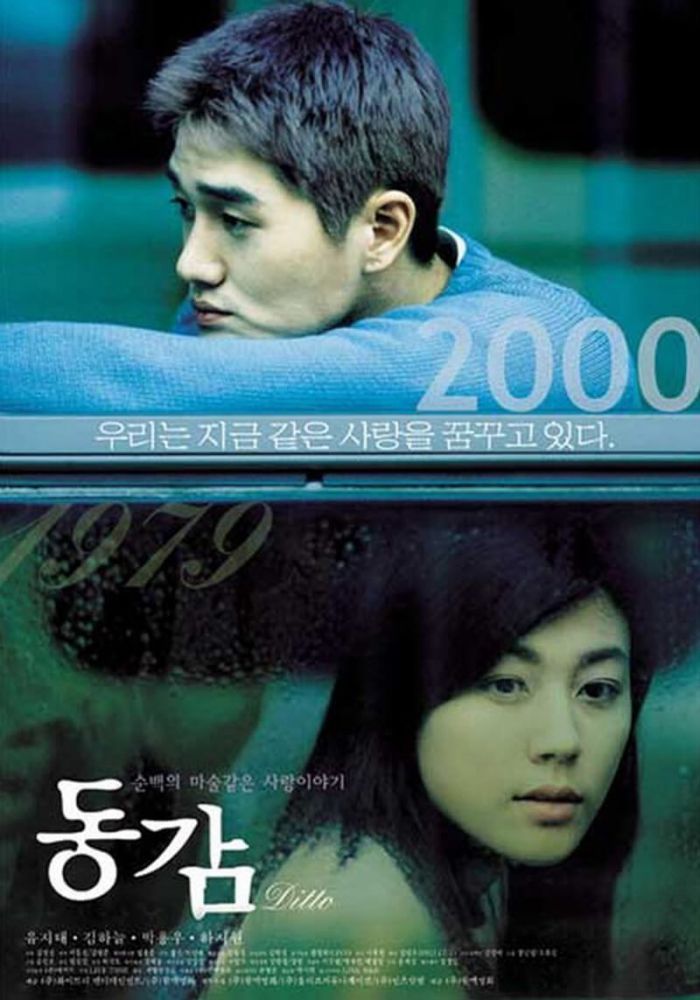Ditto by Kim Jung-Kwon (Review)

If you told me a year ago that I’d become a fan of Korean romantic melodramas, I probably would’ve laughed right in your face. A year ago, my knowledge of Asian cinema practically began with Jackie Chan and ended with John Woo. But since then, my experience has slowly but surely expanded to include the wonderful, subtle world of Korean drama. And “subtle,” I think, is the keyword here.
Unlike American melodramas, which pile on the weepy eyes and tissues, and throw in a Sarah MacLachlan song or two for good measure, Korean films keep their touch deft and light. To be sure, there are plenty of weepy, trite, and predictable moments that take place, but the heartfelt way in which they’re handled lend them a certain grace and believability that I find refreshing and completely captivating.
Take, for instance, 2000’s Ditto. When I finished the movie, I was surprised that I hadn’t rolled my eyes once or elicited a single groan. The whole premise of the movie seems custom-made for such responses. While there are a few moments when the movie loses its focus and unnecessarily ramps up the emotional content, its subtlety and grace ultimately won out.
In 1979, a pretty college student named So-Eun is overjoyed to find out that Donghee, a guy she’s had a crush on for some time, is returning to college after his military service. However, she’s incredibly shy and awkward around him, almost melting into a puddle of water à la Amélie whenever he looks at her.
Kim Ha-Neul’s performance as So-Eun truly is the heart of this movie, and she carries much of the film’s emotional content on her slim shoulders. With her expressive face, especially those eyes, she gives a completely fetching performance that never once becomes cloying. When So-Eun skips away after chatting with Donghee in the hall, her face is practically radiant, and when her eyes tremble on the verge of tears, you just want to give her a big hug. Indeed, it’s Kim’s performance that really allows the viewer to forgive the movie any of its cheesier moments.
Due to a mix-up, So-Eun finds herself in possession of a HAM radio. At first, she doesn’t know what to do with it, until someone starts broadcasting to her, that is. It’s a young man named Ji-In, who also attends her school. The two decide to meet, but there’s a slight problem. While she lives in 1979, he lives in 2000.
Much like Il Mare, an inanimate object (a HAM radio, in this case) allows our main characters to chat across the span of time. The movie hints at a few explanations (e.g., a missing transistor, a lunar eclipse) but thankfully, never really tries to explain things (again, like Il Mare). In fact, the movie even pokes fun at the scenario, with Hyung-Ji, Ji-In’s on again/off again girlfriend, commenting about this “sci-fi melodrama” he’s in.
After the two finally start to trust eachother (thanks mainly to Ji-In’s “predictions” coming true), they begin to talk about what life is like in their respective time periods. So-Eun can’t believe that the world is still around in 2000, and she has all sorts of questions of Ji-In. In fact, it’s So-Eun who does most of the talking, using Ji-In as a sort of diary as she works out her relationship with Donghee. Of course, as So-Eun learns more about Ji-In, you know there’s a twist just waiting to happen. When it does, it’s completely predictable, and yet the movie pulls it off, due in no small part to Kim Ha-Neul’s wonderful portrayal of a heartbroken So-Eun.
At times, you’re not quite sure where this whole romance thing is heading. Are So-Eun and Ji-In destined for each other, and if so, will they somehow cross time to be together? And what of Donghee and Hyung-Ji, their respective interests in their respective times? I kept expecting some unbelievably convenient event to take place, allowing the movie to end with the two somehow meeting and living happily ever after.
Alas, I see I still need to have more faith in Korean directors. While the two do end up meeting, the way in which they do so is believable and satisfying. There’s a nice sense of closure on all fronts, and especially concerning Ji-In and Hyung-Ji, whose relationship is rocky at best throughout the movie. The movie does, however, come dangerously close to sappiness at a few points, usually involving So-Eun’s pining for Donghee. Early on in the movie, it’s very sweet and cute, and even makes for one or two fairly light, amusing scenes. But as their relationship grows and changes, it makes for a few scenes that stray a little too close towards Oxygen Channel territory.
In addition, the movie works in some of the political unrest going on during So-Eun’s era, with Donghee being a student protestor and what results of that. However, the movie never really explores that issue at all, probably because it would’ve made the movie too dark and serious. In fact, when I first read the movie’s description, I was expecting something far more political. But I must say I’m glad the movie stayed its course.
The result is a very pleasant, enjoyable drama. It’s nothing weighty or heavy like Oasis, nor is it outrageously funny like My Sassy Girl. Rather, it’s remarkably subdued (again, the Il Mare comparison seems most appropriate), such that some might find it boring. It does offer the requisite weepy moments, with plenty of close-ups of eyes and lips a-tremble. There are plenty of slo-mo shots, usually involving So-Eun with some pained, longing expressing on her face. However, the movie does it with such earnestness that I found myself completely taken in.